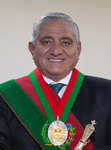| ||||||||||||||||||||||||||||||||||||||||||||||||||||||||||||||||||||
Mayor, all 11 seats in the Municipal Council 6 seats needed for a majority | ||||||||||||||||||||||||||||||||||||||||||||||||||||||||||||||||||||
|---|---|---|---|---|---|---|---|---|---|---|---|---|---|---|---|---|---|---|---|---|---|---|---|---|---|---|---|---|---|---|---|---|---|---|---|---|---|---|---|---|---|---|---|---|---|---|---|---|---|---|---|---|---|---|---|---|---|---|---|---|---|---|---|---|---|---|---|---|
| Opinion polls | ||||||||||||||||||||||||||||||||||||||||||||||||||||||||||||||||||||
| Registered | 645,000 | |||||||||||||||||||||||||||||||||||||||||||||||||||||||||||||||||||
| Turnout | 86.70% ( | |||||||||||||||||||||||||||||||||||||||||||||||||||||||||||||||||||
| ||||||||||||||||||||||||||||||||||||||||||||||||||||||||||||||||||||
| ||||||||||||||||||||||||||||||||||||||||||||||||||||||||||||||||||||
The 2021 La Paz municipal election was held in La Paz, Bolivia on Sunday, 7 March 2021, involving separate contests for mayor and all eleven municipal council seats. Incumbent mayor Luis Revilla was eligible to seek a third term but declined, leaving the mayoralty an open contest. The election was won by former minister of public works Iván Arias of the Somos Pueblo alliance, who attained a near absolute majority of 49.52 percent against a field of ten other candidates. On the municipal ballot, Somos Pueblo won 48.04 percent of the vote, winning the six seats needed to exercise a simple majority on the municipal council, with the Movement for Socialism taking the remaining five seats. Revilla's party, Sovereignty and Liberty, lost both the mayoralty and all representation on the municipal council, concluding a twenty-year period of political continuity that started in 2000 with the assumption of Juan del Granado.
Originally scheduled to take place in early 2020, this and other subnational elections were delayed by over a year as a result of the country's 2019 political crisis and the ongoing effects of the COVID-19 pandemic. Amid a rapidly shifting political landscape and no popular incumbent on the ballot, over a dozen fronts registered candidates, the most since 2004. For the nationally governing Movement for Socialism, this crowded opposition field—including two popular competing candidates in Waldo Albarracín and Iván Arias—provided an opportunity for the party to win the capital for the first time in its history. However, those prospects quickly faded following Albarracín's withdrawal, a move that established Arias as the clear frontrunner for the duration of the race. This, combined with Arias's active and unique campaign style, allowed him to garner nearly half of the total popular vote, with the remaining fifty percent divided ten ways between the other candidates.
Cite error: There are <ref group=lower-greek> tags on this page, but the references will not show without a {{reflist|group=lower-greek}} template (see the help page).

